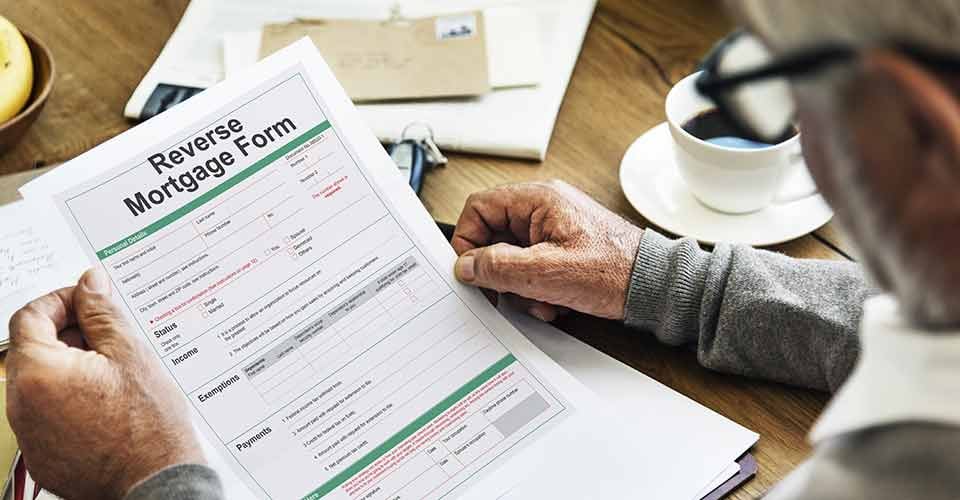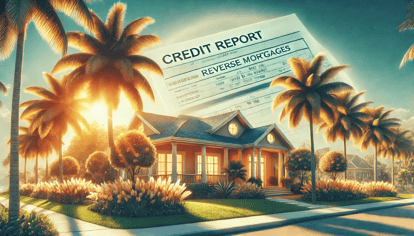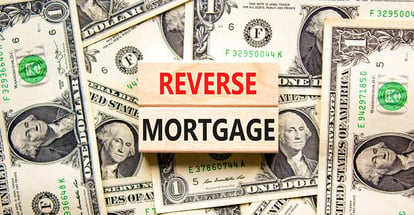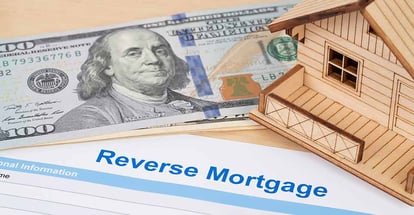What You Need to Qualify for a Reverse Mortgage in Florida
Are you an eligible homeowner in the Sunshine State who has a vision for improving your retirement years? Obtaining a reverse mortgage might just be the answer to help make that dream a reality.
A common financial product – growing more popular by the day - reverse mortgages are designed to offer homeowners 62 and older access to their home’s equity so they can enjoy life and create security during their retirement years.
Read on to learn more about what you need to qualify for a reverse mortgage in Florida!
What is a Reverse Mortgage?
Imagine this - you've spent decades building up equity in your home, and now you're in retirement and looking for ways to make the most of it.
Enter the reverse mortgage, a unique financial product that allows you to tap into the value of your home without selling it or making monthly payments to your lender. It's like unlocking a hidden treasure chest in your own backyard!
Here's how it works - if you're 62 years old or older and own a home with considerable equity, you can borrow against its value and receive funds in a way that suits your needs.
You could get a lump sum of cash to renovate your dream kitchen, set up a fixed monthly payment to cover your living expenses, or even have a line of credit that you can access whenever you need it.
The best part? You don't have to pay back the loan until you sell your home, move away permanently, or pass away. It's a flexible and convenient way to put your home equity to work for you!
But not all reverse mortgages are created equal. The most common type is the home equity conversion mortgage (HECM), which is available for homes valued up to $970,800.
If your home is worth more, you can explore the jumbo reverse mortgage, also known as a proprietary reverse mortgage. With different options and eligibility requirements, it's important to do your research and find the right fit for your unique situation.
Speaking of eligibility, the good news is that the qualifications for a reverse mortgage are relatively straightforward.
As long as you're at least 62 years old and own a significant amount of equity in your home, you're on the right track. Most lenders typically require you to have at least 50% equity, but the exact percentage may vary.
Unlike traditional mortgages, there are no credit score or income requirements, making it more accessible for retirees who may not have a regular paycheck.
To ensure that you're making an informed decision, the U.S. Department of Housing and Urban Development (HUD) requires all prospective reverse mortgage borrowers to complete a HUD-approved counseling session.
This session will provide you with valuable information and help you understand the ins and outs of reverse mortgages, so you can confidently make the right choice for your financial future.
Keep in mind that while you won't have to make monthly payments to your lender, you'll still need to cover certain costs. There's an origination fee and an up-front mortgage insurance premium, which are typically rolled into the loan.
And of course, as a homeowner, you'll need to continue paying property taxes and homeowners insurance to keep your home in good standing.
So why wait? Don't let your home equity sit idle when it could be working for you during your retirement years. Consider a reverse mortgage as a way to unlock the hidden potential of your home and enjoy the financial freedom you deserve.
Contact a trusted lender or financial advisor to explore your options and take the first step towards a more secure retirement. Your home could be the key to unlocking a brighter future!
What Is Required To Get a Reverse Mortgage?
To be eligible for a reverse mortgage, you need to fulfill certain criteria, with the key factors being your age and the equity you possess in your home.
Your age
Reverse mortgages are specifically tailored for older homeowners who lack alternative retirement savings and wish to tap into the equity they have accumulated in their home.
As such, the minimum age requirement to qualify for a reverse mortgage is 62 years old.
If you wish to include your spouse as a co-borrower, they too must be at least 62 years old, which is recommended if feasible.
Equity requirements
To be eligible for a reverse mortgage, you must also possess a significant level of equity in your home, typically amounting to at least 50% of its value.
Furthermore, you must reside in the property against which you are seeking the reverse mortgage, which can include houses, condominiums, townhouses, or manufactured homes built after June 15, 1976.
It's important to note that under FHA regulations, reverse mortgages are not available for cooperative housing owners, as they technically do not own the real estate itself, but rather hold shares of a corporation.
In New York, where co-ops are common, state law had previously prohibited reverse mortgages in co-ops, permitting them only for one- to four-family residences and condos.
However, in December 2021, Governor Kathy Hochul signed a bill that now allows New Yorkers aged 70 and older to obtain reverse mortgages on their co-op apartments.
The bill came into effect in March 2022, granting residents of New York State the opportunity to qualify for two types of reverse mortgages - HECMs insured by the federal government or proprietary reverse mortgages.
Income and credit checks
Unlike home equity loans or home equity lines of credit (HELOCs), reverse mortgages do not impose income or credit score prerequisites. This sets them apart from other options that allow homeowners to tap into their home equity.
Unlike reverse mortgages, both home equity loans and HELOCs necessitate regular payments and mandate a decent credit score for qualification.
However, it's worth noting that these alternatives may entail fewer fees and potentially offer a more cost-effective solution compared to a reverse mortgage.
Counseling
As part of the requirements set by the U.S. Department of Housing and Urban Development (HUD), all potential reverse mortgage borrowers are obligated to undergo a counseling session that has been approved by HUD.
This session, which typically incurs a fee of approximately $125, is designed to last at least 90 minutes and entails a comprehensive discussion of the advantages and disadvantages associated with obtaining a reverse mortgage, taking into consideration your specific financial and personal circumstances.
During the counseling session, the HUD-approved counselor will provide detailed explanations on how a reverse mortgage may impact your eligibility for Medicaid and Supplemental Security Income (SSI).
Additionally, the counselor should also provide information on the various options for receiving the proceeds from the reverse mortgage.
Up-front costs
Reverse mortgages come with associated expenses, including an origination fee and an up-front mortgage insurance premium.
These costs are typically deducted from the loan itself, which means that borrowers may not need to rely on their savings to cover them.
However, it's crucial to note that the up-front costs of reverse mortgages can be substantial, whether they are paid out of pocket or from the equity owned by the borrower.
Your responsibilities
Although not strictly a prerequisite for obtaining a reverse mortgage, it's important to note that borrowers are responsible for ongoing payments of property taxes and homeowners insurance once the mortgage is in effect.
Failure to keep up with these payments or vacating the home for more than one year, even for medical reasons such as residing in a long-term care facility, may result in the loan becoming due for repayment, usually through the sale of the house.

What Disqualifies You From Getting a Reverse Mortgage?
However, there are several factors that could disqualify you from getting a reverse mortgage.
-
Age - The minimum age requirement for a reverse mortgage is 62 years old. If you are younger than 62, you will not be eligible for a reverse mortgage. Age is a crucial factor as reverse mortgages are designed specifically for older homeowners to access the equity they have built up in their homes to support their retirement needs.
-
Residency - Reverse mortgages require you to live in your home as your primary residence for the entire duration of the loan. If you do not intend to use the property as your primary residence, or if you plan to live away from the property for an extended period of time, you may not qualify for a reverse mortgage. Vacation homes or rental properties are not eligible for reverse mortgages, as they are meant for primary residences only.
-
Homeownership - To qualify for a reverse mortgage, you must either own your home outright or have a significant amount of equity in your home, generally at least 50%. If you do not meet these requirements, you may not be eligible for a reverse mortgage loan.
-
Financial Stability - While reverse mortgages do not have income or credit score requirements, you must have the financial capacity to cover the costs associated with the loan, such as property taxes, homeowners insurance, and maintenance expenses. If your financial situation is unstable or you do not have the means to cover these costs, you may not qualify for a reverse mortgage.
-
Property Type - Reverse mortgages are typically available for single-family homes, condominiums, townhouses, and manufactured homes built on or after June 15, 1976. If your property does not fall into one of these categories, it may not be eligible for a reverse mortgage.
-
Existing Liens - If you have existing liens or mortgages on your home, you may need to pay off those debts before being eligible for a reverse mortgage. This is because reverse mortgages are designed to be the primary lien on the home, and existing liens could complicate the loan process.
- Counseling - The U.S. Department of Housing and Urban Development (HUD) requires all prospective reverse mortgage borrowers to complete a HUD-approved counseling session. If you fail to complete this counseling session, you may not be eligible for a reverse mortgage.
What Percentage of Equity Is Needed for a Reverse Mortgage?
To be eligible for a reverse mortgage, borrowers are typically required to either own their home outright or have a substantial amount of equity.
The exact percentage of equity needed may vary depending on the lender and the type of reverse mortgage, but a common guideline is to have at least 50% equity in your home.
What Are the Three Types of Reverse Mortgages?
There are three types of reverse mortgages available:
-
single-purpose reverse mortgages provided by select state and local government agencies and nonprofits;
-
proprietary reverse mortgages, which are private loans; and
- federally insured reverse mortgages, commonly referred to as home equity conversion mortgages (HECMs).
The Bottom Line
Qualifying for a reverse mortgage in Florida is not as complicated as you may think. As long as you meet the eligibility criteria and have all the necessary financial documents on hand, you should be able to reap the advantages that come with it.
Remember, reverse mortgages can provide security for retirement and may allow you to do things like make home improvements or travel worry-free.
A reverse mortgage can give seniors more freedom, stability and certainty throughout retirement. If a reverse mortgage sounds like something you'd like to explore, your first step should be reaching out to an experienced lender who can take you through all of the details, qualifications and restrictions.
MakeFloridaYourHome.com is here to help and answer any questions, so don't hesitate to contact them. With the right guidance and careful evaluation of your financial needs and obligations, a reverse mortgage could yield many rewards which will enhance your later years.
With over 50 years of mortgage industry experience, we are here to help you achieve the American dream of owning a home. We strive to provide the best education before, during, and after you buy a home. Our advice is based on experience with Phil Ganz and Team closing over One billion dollars and helping countless families.

About Author - Phil Ganz
Phil Ganz has over 20+ years of experience in the residential financing space. With over a billion dollars of funded loans, Phil helps homebuyers configure the perfect mortgage plan. Whether it's your first home, a complex multiple-property purchase, or anything in between, Phil has the experience to help you achieve your goals.


 By
By  Edited by
Edited by 






